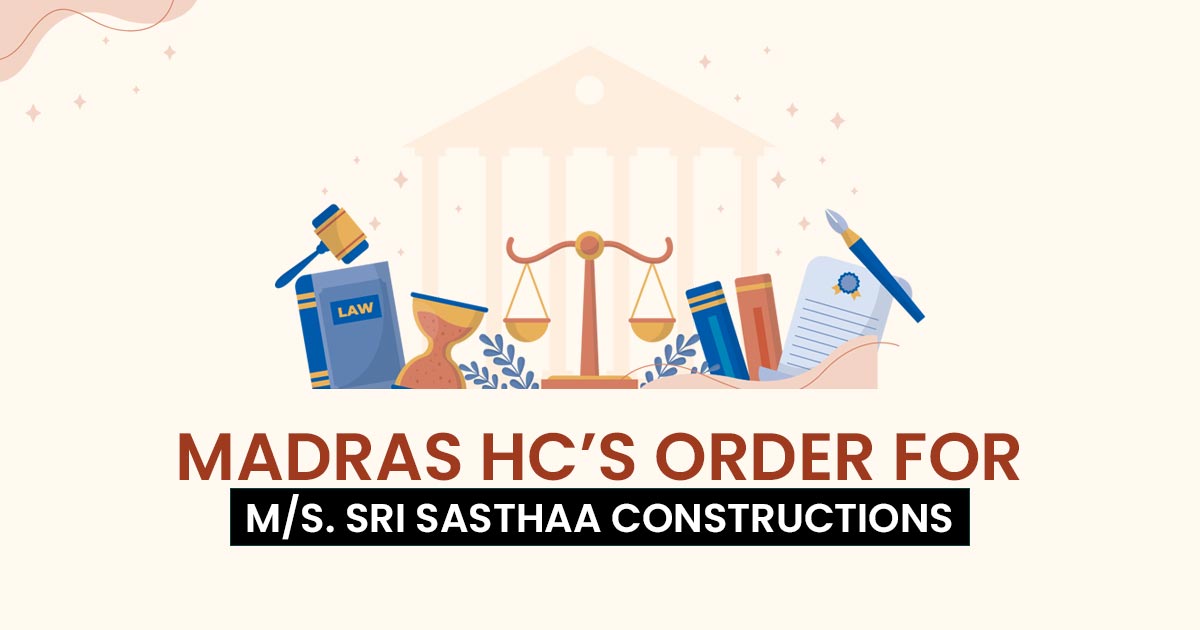
The Madras High Court ruled the Assessing Officer (AO) to permit the transitional credit of purchase tax paid under Section 140 of the TNGST Act, 2017, if the applicant had paid “purchase tax” under Section 12(1) of the TNVAT Act.
The bench of Justice C. Saravanan noted that the applicant deserves an opportunity to safeguard the case since the impugned assessment order was passed when the country was in semi-lockdown mode. If the VAT-TDS had indeed stayed unused for discharging tax obligations under the TNVAT Act, 2006.
There must be a new adjustment of the amount out of the VAT-TDS for the tax obligation of the applicant, and thereafter, ITC, which would have remained unused, ought to have been authorized to be transitioned under Section 140 of the Act or refunded to the applicant under Section 54 of the TNGST Act, 2017 read with the TNVAT Act, 2006.
The applicant/taxpayer is a works contractor who has generated a works contract service. The employer who had employed the applicant as a works contractor had deducted the tax deducted at source (TDS) amount under Section 13 of the Tamil Nadu Value Added Tax Act, 2006 (TNVAT Act). The tax deducted at source was transitioned under Section 140 of the TNGST Act, 2017, including the “purchase tax” filed via the applicant, which was claimed as an input tax credit (ITC).
Respondent incorrectly refused the tax transmitted. The applicant has filed the writ petition after obtaining the second specified final demand notice or final order, seeking the applicant to file the amount assured for the tax arrears.
The taxpayer argued that the applicant was qualified for the transition of the credit of ITC unutilized in the VAT Account, and the Assessment Order, which has been passed without obeying the principles of natural justice, is thus accountable to be suppressed.
Read Also: Madras HC Directs Reassessment Order Concerning GST ITC Reversal & Bank Attachment
The writ petition is been contended by the respondent department contesting the order based on the principles of natural justice or any additional basis, viz., lack of jurisdiction, etc., is available to the petitioner only if the writ petition was filed within the course of limitation.
The taxpayer argued that the assessment order was passed at the time of the period when the 2nd wave of COVID-19 (Omicron) was at its peak in April 2021. The petitioner explains that the applicant committed an aged accountant as a tax consultant to take care of the matter of the petitioner and that the said accountant also died due to the COVID-19 pandemic. Therefore, the statutory appeal cannot be filed under Section 107 of the TNGST Act, 2017.
The court stated that “If the petitioner validly availed ITC on “purchase tax” paid by the petitioner under Section 12(1) of the TNVAT Act, 2006, and the same was remaining unutilized, the petitioner was entitled to transition the same under Section 140 of the TNGST Act, 2017 as transitional credit,”
The assessing officer is asked by the court to do the assessment again via the first adjusting the tax deducted at source under Section 13(1) of the TNVAT Act, 2006, read with TNVAT Rules, 2007 and paying to the credit of the government, and subsequently refunding the surplus amount of input tax credit that would have stayed unused after adjustment of the tax deducted at source under Section 13(1) of the TNVAT Act, 2006, read with TNVAT Rules, 2007 and ITC for the tax liability for the applicant during filing returns in dispute time.
| Case Title | M/s.Sri Sasthaa Constructions Vs. Assistant Commissioner (ST) |
| Case No. | W.P.Nos.20871 & 20874 of 2023, and W.M.P.Nos.20240, 20241 & 20243 of 2023 |
| Date | 16.02.2024 |
| For Petitioner | M/s.Aparna Nandakumar |
| For Respondent | Mr.C.Harsharaj |
| Madras High Court | Read Order |